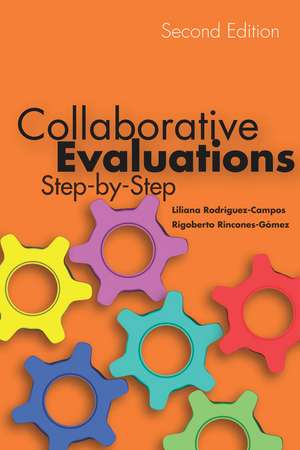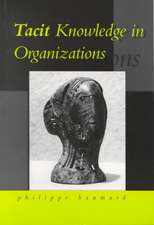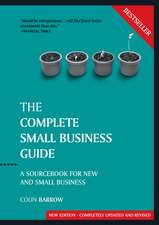Collaborative Evaluations: Step-by-Step, Second Edition
Autor Liliana Rodríguez-Campos, Rigoberto Rincones-Gómezen Limba Engleză Paperback – 20 noi 2012
Collaborative Evaluations: Step-by-Step, Second Edition is a comprehensive guide for evaluators who aim to master collaborative practice. Liliana Rodríguez-Campos and Rigoberto Rincones-Gómez present their Model for Collaborative Evaluations (MCE) with its six major components: identify the situation, clarify the expectations, establish a collective commitment, ensure open communication, encourage effective practices, and follow specific guidelines.
Fully updated to reflect the state-of-the-art in the field, each core chapter addresses one component of the model, providing step-by-step guidance, as well as helpful tips for successful application. To further demonstrate the utility of the MCE, this new edition includes recurring vignettes about several evaluators and clients, illustrating frequent questions and specific challenges that arise when evaluators take a collaborative approach. Drawing on a wide range of collaborative evaluations conducted in the business, nonprofit, and education sectors, this precise and easy-to-understand guide is ideal for students and practitioners who want to use its tools immediately.
Fully updated to reflect the state-of-the-art in the field, each core chapter addresses one component of the model, providing step-by-step guidance, as well as helpful tips for successful application. To further demonstrate the utility of the MCE, this new edition includes recurring vignettes about several evaluators and clients, illustrating frequent questions and specific challenges that arise when evaluators take a collaborative approach. Drawing on a wide range of collaborative evaluations conducted in the business, nonprofit, and education sectors, this precise and easy-to-understand guide is ideal for students and practitioners who want to use its tools immediately.
| Toate formatele și edițiile | Preț | Express |
|---|---|---|
| Paperback (1) | 345.35 lei 3-5 săpt. | |
| Stanford University Press – 20 noi 2012 | 345.35 lei 3-5 săpt. | |
| Hardback (1) | 1209.75 lei 6-8 săpt. | |
| Stanford University Press – 20 noi 2012 | 1209.75 lei 6-8 săpt. |
Preț: 345.35 lei
Nou
Puncte Express: 518
Preț estimativ în valută:
66.09€ • 68.82$ • 55.86£
66.09€ • 68.82$ • 55.86£
Carte disponibilă
Livrare economică 17 februarie-03 martie
Preluare comenzi: 021 569.72.76
Specificații
ISBN-13: 9780804778091
ISBN-10: 0804778094
Pagini: 264
Dimensiuni: 152 x 229 x 20 mm
Greutate: 0.32 kg
Ediția:2
Editura: Stanford University Press
Colecția Stanford Business Books
ISBN-10: 0804778094
Pagini: 264
Dimensiuni: 152 x 229 x 20 mm
Greutate: 0.32 kg
Ediția:2
Editura: Stanford University Press
Colecția Stanford Business Books
Recenzii
"Professional competence in the practice of evaluation now requires a thorough understanding of the most widely used trio of evaluation models—participatory, collaborative, and empowerment evaluation. This means more than—though it must include—their definitions and differences. It means an understanding of the great range of practical details and difficulties that each involve. This book is the best way to get that essential understanding of collaborative evaluation, which is, in my view, the most sensible of the three approaches: It's well-organized, clearly written, interesting, and comprehensive—really earning the title of a handbook."—Michael Scriven, Professor of Psychology, Claremont Graduate University and Past President, American Evaluation Association and American Educational Research Association
"This book is a powerful and essential tool for community-based organizations preparing to increase service delivery and program outcomes. Decreased funding has caused many leaders to shift their focus to new approaches to stakeholder involvement. National centers are raising funding accountability. This book is the #1 guide for leaders."—Debra E. Thrower, Professor of Social Work, Saint Leo University
"Collaborative Evaluations is a practical guide which demystifies evaluation with a user-friendly language and simple descriptions of its purpose and the process. Through the Model for Collaborative Evaluations, the book offers experienced practitioners, as well as neophytes, a tool that builds on what evaluation is all about: managing human relationships. I would recommend this improved second edition to all who believe that effective stakeholder engagement is key to the usefulness of evaluations."—Dieudonné Mouafo, Chief, Evaluation Unit, United Nations Volunteers
"For too long, evaluation has been viewed as something done to programs rather than with programs. This book demonstrates how evaluators and program operators can work together more closely and productively. It offers practical advice on how to clarify roles and expectations, ensure open communications, and engage people in the evaluation process."—Thomas Brock, Director, Young Adults and Postsecondary Education, MDRC
"This engaging book is a must read for anyone who cares about making the evaluation process more useful and inclusive. The Model for Collaborative Evaluations is a refreshing, new framework from two noted scholars that provides helpful tools to build relationships that strengthen the process and involve stakeholders at every stage."—Caroline Altman Smith, Senior Program Officer, The Kresge Foundation
"To read this book is to enter into collaboration with recognized experts in this approach to evaluation. The reader gains access to the authors' wealth of experience in the field, as well as their enthusiasm for collaborative evaluation. This book inspires as well as it instructs."—Michael Nokes, Michigan Department of Corrections
"Collaborative Evaluations is a map for the novice and seasoned alike. The landmarks in it are easily recognizable—from stakeholders to logic models and summative evaluation to standards. The guidelines are both creative and insightful. However, the authors' truly unique contribution is how they weave together these ingredients to help ensure full participation and collaboration."—David M. Fetterman, President and CEO, Fetterman & Associates and Past President, American Evaluation Association and American Anthropological Association
"This book should be in the toolbox of every evaluator! Bringing the lessons from their experiences to the masses, the authors demonstrate how to use the Model for Collaborative Evaluations, providing a succinct set of guidelines for the process of evaluation. This book makes MCE palatable for users with any level of evaluation expertise."—LaShonda Coulbertson, President and CEO, Nia Research Consulting and Evaluation, LLC
"A sound and insightful guide to help evaluators systematically navigate the intricacies of conducting collaborative evaluations. The straightforward, pragmatic steps of the Model for Collaborative Evaluations are supported by theoretical underpinnings and lead to a standardized, yet flexible, framework for users to apply to a wide cross section of evaluands."—Wes Martz, Vice President, Kadant Inc. and President, American Marketing Association, Southwest Michigan
"Collaborating during an evaluation can be a challenging experience, riddled with pitfalls and potholes. An evaluation will sink or swim based on the communication skills of the evaluator. Collaborative Evaluations presents a comprehensive framework for working with stakeholders who have a vested interest in the evaluation. This book provides bedrock principles for smooth and collaborative evaluation project management."—Willis H. Thomas, Chief Learning Officer, lessonslearned.info and Past Vice President, Project Management Institute Grand Rapids, Michigan Chapter
"To read this book is to enter into collaboration with recognized experts in this approach to evaluation. The reader gains access to the authors' wealth of experience in the field, as well as their enthusiasm for collaborative evaluation. This book inspires as well as it instructs."—Michael Nokes, Michigan Department of Corrections
"Collaborative Evaluations is a map for the novice and seasoned alike. The landmarks in it are easily recognizable—from stakeholders to logic models and summative evaluation to standards. The guidelines are both creative and insightful. However, the authors' truly unique contribution is how they weave together these ingredients to help ensure full participation and collaboration."—David M. Fetterman, President and CEO, Fetterman & Associates and Past President, American Evaluation Association and American Anthropological Association
"This book should be in the toolbox of every evaluator! Bringing the lessons from their experiences to the masses, the authors demonstrate how to use the Model for Collaborative Evaluations, providing a succinct set of guidelines for the process of evaluation. This book makes MCE palatable for users with any level of evaluation expertise."—LaShonda Coulbertson, President and CEO, Nia Research Consulting and Evaluation, LLC
"A sound and insightful guide to help evaluators systematically navigate the intricacies of conducting collaborative evaluations. The straightforward, pragmatic steps of the Model for Collaborative Evaluations are supported by theoretical underpinnings and lead to a standardized, yet flexible, framework for users to apply to a wide cross section of evaluands."—Wes Martz, Vice President, Kadant Inc. and President, American Marketing Association, Southwest Michigan
"Collaborating during an evaluation can be a challenging experience, riddled with pitfalls and potholes. An evaluation will sink or swim based on the communication skills of the evaluator. Collaborative Evaluations presents a comprehensive framework for working with stakeholders who have a vested interest in the evaluation. This book provides bedrock principles for smooth and collaborative evaluation project management."—Willis H. Thomas, Chief Learning Officer, lessonslearned.info and Past Vice President, Project Management Institute Grand Rapids, Michigan Chapter
Notă biografică
Liliana Rodríguez-Campos is Associate Professor and Director of the Center for Research, Evaluation, Assessment, and Measurement at the University of South Florida. Rigoberto Rincones-Gómez is Associate Vice President for Institutional Research, Planning, and Effectiveness at Broward College.
















